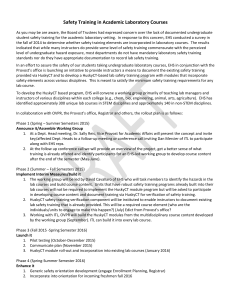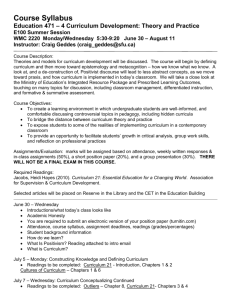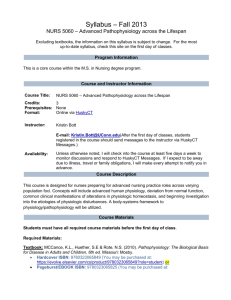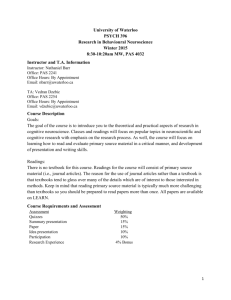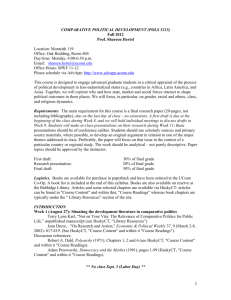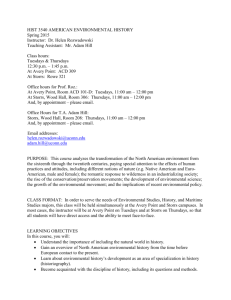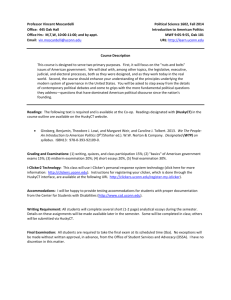GLOBALIZATION AND CONTENTIOUS POLITICS
advertisement
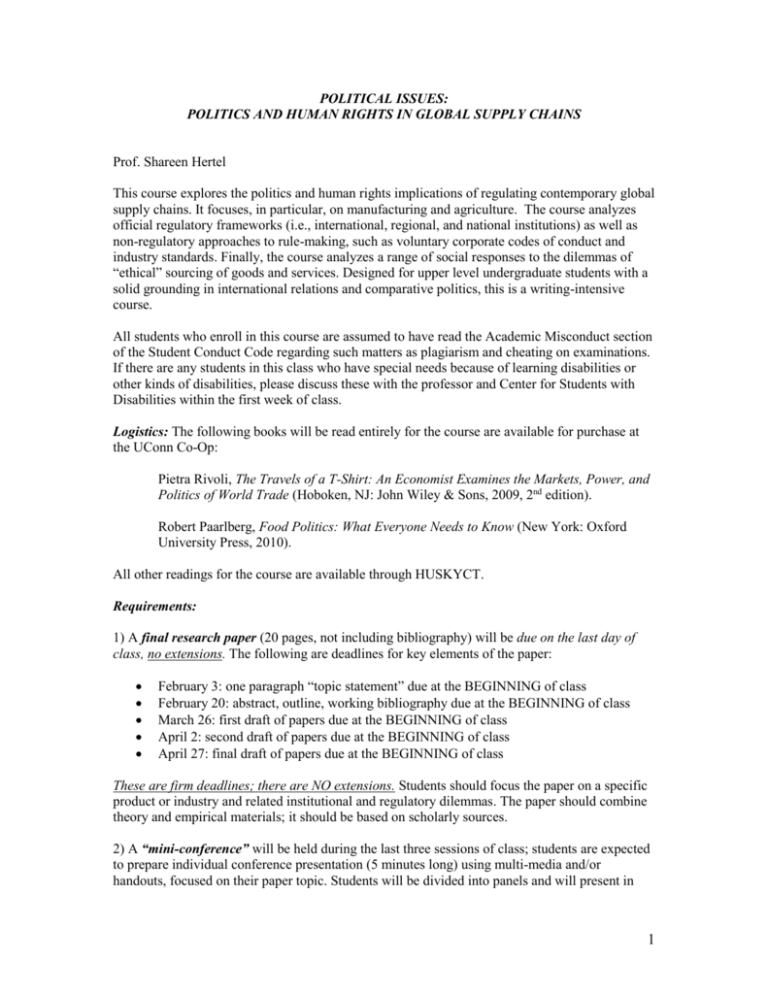
POLITICAL ISSUES: POLITICS AND HUMAN RIGHTS IN GLOBAL SUPPLY CHAINS Prof. Shareen Hertel This course explores the politics and human rights implications of regulating contemporary global supply chains. It focuses, in particular, on manufacturing and agriculture. The course analyzes official regulatory frameworks (i.e., international, regional, and national institutions) as well as non-regulatory approaches to rule-making, such as voluntary corporate codes of conduct and industry standards. Finally, the course analyzes a range of social responses to the dilemmas of “ethical” sourcing of goods and services. Designed for upper level undergraduate students with a solid grounding in international relations and comparative politics, this is a writing-intensive course. All students who enroll in this course are assumed to have read the Academic Misconduct section of the Student Conduct Code regarding such matters as plagiarism and cheating on examinations. If there are any students in this class who have special needs because of learning disabilities or other kinds of disabilities, please discuss these with the professor and Center for Students with Disabilities within the first week of class. Logistics: The following books will be read entirely for the course are available for purchase at the UConn Co-Op: Pietra Rivoli, The Travels of a T-Shirt: An Economist Examines the Markets, Power, and Politics of World Trade (Hoboken, NJ: John Wiley & Sons, 2009, 2nd edition). Robert Paarlberg, Food Politics: What Everyone Needs to Know (New York: Oxford University Press, 2010). All other readings for the course are available through HUSKYCT. Requirements: 1) A final research paper (20 pages, not including bibliography) will be due on the last day of class, no extensions. The following are deadlines for key elements of the paper: February 3: one paragraph “topic statement” due at the BEGINNING of class February 20: abstract, outline, working bibliography due at the BEGINNING of class March 26: first draft of papers due at the BEGINNING of class April 2: second draft of papers due at the BEGINNING of class April 27: final draft of papers due at the BEGINNING of class These are firm deadlines; there are NO extensions. Students should focus the paper on a specific product or industry and related institutional and regulatory dilemmas. The paper should combine theory and empirical materials; it should be based on scholarly sources. 2) A “mini-conference” will be held during the last three sessions of class; students are expected to prepare individual conference presentation (5 minutes long) using multi-media and/or handouts, focused on their paper topic. Students will be divided into panels and will present in 1 succession; the instructor will assign panels based on the topics chosen by students. Class discussion will follow each panel. Participation in this in-class conference is mandatory and should be taken seriously; your course participation grade is derived, in part, from your participation in the conference. 3) Weekly discussion questions: The professor will post weekly study questions on HUSKYCT; please use these to prepare for class. Your class participation grade will derive, in part, from your engagement in discussion around these questions. Course grades are calculated as follows: Course participation: Topic statement Abstract, outline, working bibliography First draft: Second draft: Final draft: Final exam: 10% of final grade 2.5% of final grade 2.5% of final grade 15% of final grade 20% of final grade 45% of final grade 5% of final grade INTRODUCTION Wednesday, January 18 UNDERSTANDING THE BASICS: Key concepts and institutions Friday, January 20 Timothy J. Sturgeon, "How Do We Define Value Chains and Production Networks?" in Gary Gereffi and Raphael Kaplinsky, co-editors. The Value of Value Chains: Spreading the Gains from Globalisation, Special issue of the IDS Bulletin 32, 3 (July 2001), Brighton, UK: Institute of Development Studies at the University of Sussex. Available in HuskyCT, under “Course Readings.” Monday, January 23 Please review documents on the main webpage of the the International Labour Organization (ILO) "Helpdesk for Business on International Labour Standards." Available in HuskyCT under "Course Weblinks.” ALL students should come with written responses to the Discussion Questions for this session’s readings. Wednesday, January 25 Class session on fundamentals of writing a research papers (includes discussion of the requirements for the research paper due in this course). Friday, January 27 Library research & information session with Steve Batt (Reference Librarian) GO DIRECTLY to Babbidge Library, Second Floor Electronic Classroom Monday, January 30 Layna Mosley and Saika Uno, "Racing to the Bottom or Climbing to the Top? Economic Globalization and Collective Labor Rights," Comparative Political Studies 40, 8 (2007): 923-948. Available in HuskyCT under "Course Readings." Mosely, Layna. “Free Trade Can Lift Labor Standards Abroad,” The New York Times, 27 October 2011. Available in HuskyCT under “Course Readings.” Wednesday, February 1 2 Richard Locke, Matthew Amengual, and Akshay Mangla. "Virtue out of Necessity? Compliance, Commitment, and the Improvement of Labor Conditions in Global Supply Chains," Politics & Society 37, 3 (2009): 319-351. Available in HuskyCT under "Course Readings." ** HR Film Series: "Blood in the Mobile" (Konover Auditorium/Dodd Center, 4 p.m.) Friday, February 3 In class discussion of “Blood in the Mobile “(Film). ** One paragraph “topic statement” due at the beginning of class. ** POLITICAL ECONOMY APPLIED: The Manufacturing sector Monday February 6 Marsha A. Dickson, Suzanne Loker, and Molly Eckman. “Key Stakeholders for Social Responsibility” (Chapter 5), Social Responsibility in the Global Apparel Industry (New York: Fairchild Books/Conde Nast, 2009), Pages 129-162. Available in HuskyCT under "Course Readings." Wednesday, February 8 Mark Anner, "Workers' Power in Global Value Chains: Ending Sweatshop Practices at Russell, Nike, and Knights Apparel," in Transnational Trade Unionism: New Capabilities and Prospects, eds. Peter Fairbrother, Marc-Antonin Hennebert, and Christian Lévesque (New York: Routledge, Taylor & Francis - forthcoming). Available in HuskyCT under "Course Readings." Friday, February 10 In class session on Abstract Writing (with Writing Center staff). Monday, February 13 Rivoli, Travels of a T-Shirt, Chapters 1, 2. 3 and 4. Wednesday, February 15 Shareen Hertel “The Paradox of Partnership: Assessing New Forms of NGO Advocacy on Labor Rights,” Ethics & International Affairs 24, 2 (Summer 2010): 171-189. Available in HuskyCT under "Course Readings." Friday, February 17 In class peer review exercise (in small groups -- i.e., organized by panels). Monday, February 20 Rivoli, Travels of a T-Shirt, Chapters 5-6 (pages 77-104). ** Abstract, outline, and working bibliography due at the BEGINNING of class ** Wednesday, February 22 Rivoli, Travels of a T-Shirt, Chapters 7-8 (pages 105-139) Friday, February 24 Julie Elkins and Shareen Hertel, “Sweatshirts and Sweatshops: Labor Rights, Student Activism, and the Challenges of Collegiate Apparel Manufacturing,” in In Our Own Backyard: Human Rights in the USA (Philadelphia, PA: Univ. of Pennsylvania Press). Available in HuskyCT under "Course Readings." Monday, February 27 Guest lecture by Bill Simpson (Director, UConn Co-Op) 3 POLITICAL ECONOMY APPLIED: The Agricultural Sector Wednesday, February 29 Paarlberg, Food Politics, Chapters 1, 3, 9 Friday, March 2 Paarlberg, Food Politics, Chapters 10, 11, 12 Monday, March 5 Guest lecture by Dennis Pierce (Director, UConn Dining Services) Wednesday, March 7 Deborah Barndt, “Across Space and through Time: Tomatl Meets the Corporate Tomato” (Chapter 1), Tangle Routes: Women, Work and Globalization on the Tomato Trail (Lanham, MA: Rowman & Littlefield, 2008). Pages 8-62. Available in HuskyCT under "Course Readings." ** HR Film Series: "China Blue" (Konover Auditorium/Dodd Center, 4 p.m.)** Friday, March 9 Stacy Tessier, “Rethinking the Food Chain: Farmworkers and the Taco Bell Boycott,” Journal of Developing Societies (2007), vol. 23, issues 1-2: 89-97. Available in HuskyCT under "Course Readings." WEEK OF MARCH 11 – SPRING BREAK; NO CLASS Monday, March 19 Paarlberg, Food Politics, Chapters 13-14. Wednesday, March 21 Michigan State University Extension (Deliberative Dialoge Series). The Rising Cost of Food: What Is Our Food Future? (East Lansing, MI: MSU, 2009). Available in HuskyCT under "Course Readings." Friday, March 23 In-class viewing/discussion of “Food, Inc.” (film) INSTITUTIONAL REFORM: Governing global supply chains Monday, March 26 ** First draft of papers DUE at the BEGINNING of CLASS ** John Humphrey and Hubert Schmitz, "Governance in Global Value Chains," in Gary Gereffi and Raphael Kaplinsky, co-editors. The Value of Value Chains: Spreading the Gains from Globalisation, Special issue of the IDS Bulletin 32, 3 (July 2001), Brighton, UK: Institute of Development Studies at the University of Sussex. Available in HuskyCT under "Course Readings." Wednesday, March 28 Kimberly Ann Elliott and Richard B. Freeman, "Globalization versus labor standards?" (Chapter 1, pages 7-25) in Can Labor Standards Improve Under Globalization (Washington, DC: Peterson Institute for International Economics, 2003). Available in HuskyCT under "Course Readings." [Note: this particular reading cannot be printed out, for copyright reasons, so please read it online; all other readings in the course can be printed out.] 4 Friday, March 30 In class peer review exercise (in small groups -- i.e., organized by panels). Monday, April 2 Catherine S. Dolan and Meenu Tewari, "From What We Wear to What We Eat: Upgrading in Global Value," in Gary Gereffi and Raphael Kaplinsky, co-editors. The Value of Value Chains: Spreading the Gains from Globalisation, Special issue of the IDS Bulletin 32, 3 (July 2001), Brighton, UK: Institute of Development Studies at the University of Sussex. Available in HuskyCT under "Course Readings." ** Second draft of papers, due at the beginning of class** Wednesday, April 4 Rivoli, Travels of a T-Shirt, Chapters 9-12 (pages 141-212) ** See also: April 5, HR Film Festival, "La Cosecha" (4 p.m. Konover Auditorium/Dodd Center)** Friday, April 6 Rivoli, Travels of a T-Shirt, Chapters 13-15 (pages 213-256). Monday, April 9 Anderson, Molly. "Rights-based Food Systems and the Goals of Food Systems Reform," Agriculture and Human Values 25, 4 (December 2008): 593-608. Wednesday, April 11 Individual sessions with Prof. Hertel to discuss second drafts Friday, April 13 In class small group preparation for mini-conference (i.e., with panels). Monday April 16 “Mini-conference on Globalization: Student Perspectives” Introductory remarks, Prof. Hertel Paper presentations and discussion Panel 1 = 3 students @ 10 minutes/each plus 10 minutes general discussion Wednesday, April 18 Paper presentations and discussion Panel 2 = 4 students @ 10 minutes/each plus 10 minutes general discussion Friday, April 20 Paper presentations and discussion Panel 3 = 4 students @ 10 minutes/each plus 10 minutes general discussion Monday, April 23 Paper presentations and discussion Panel 4 = 4 students @ 10 minutes/each plus 10 minutes general discussion Wednesday, April 25 Paper presentations and discussion Panel 5 = 4 students@ 10 minutes/each plus 10 minutes general discussion 5 Friday, April 27 Concluding session – wrap-up and course evaluation FINAL PAPERS DUE in CLASS Final Exam: TBA 6
